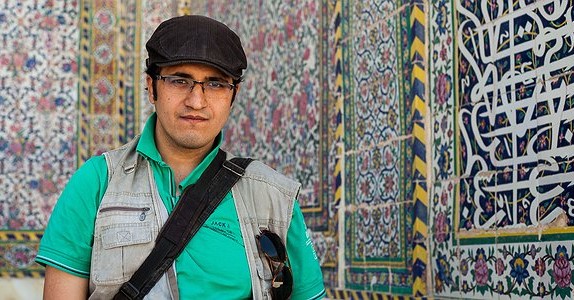Source: www.hra-news.org
Iran Press Watch
 Despite completing his sentence, Moin Mohammadi was sentenced to 3 years and 3 months in prison
Despite completing his sentence, Moin Mohammadi was sentenced to 3 years and 3 months in prison
HRANA ‒ Moin Mohammadi, a Baha’i citizen from Yazd, has been sentenced to another 3 years and 3 months in prison in the same case, despite spending 1 year under electronic surveillance in the city. Pursuant to Article 134 of the Islamic Penal Code, the most severe punishment ‒ i.e. 31 months and 16 days of imprisonment ‒ minus one year that has already been served, leaves 19 months and 16 days of imprisonment applicable to him. The verdict on Mr. Mohammadi by the Court of Appeals, after re-examination and a retrial in Branch 39 of the Supreme Court, was revoked, and the verdict of the primary court of 6 years in prison was upheld. After the application of the reduction law, the verdict was reduced to 3 years and 3 months imprisonment.
As reported by HRANA, the news agency of Human Rights Activists in Iran, Moin Mohammadi, a Baha’i citizen from Yazd, has again been sentenced to 3 years and 3 months in prison in the same case, despite having already spent 1 year under electronic surveillance within the city.
According to this verdict, which was issued on April 13th of this year and announced by Branch 1 of the Revolutionary Court of Yazd, presided over by Judge Amir Hossein Gharaghani, Moin Mohammadi was sentenced to 31 months and 16 days in prison on charges of “membership in opposition groups” and 7 months and 16 days in prison on charges of “propaganda against the regime in favor of opposition groups”, for a total of 3 years, 3 months and 2 days in prison.
Pursuant to Article 134 of the Islamic Penal Code, the most severe punishment ‒ i.e. 31 months and 16 days of imprisonment ‒ minus one year that has already been served, leaves 19 months and 16 days of imprisonment applicable to him. The verdict regarding Mr. Mohammadi by the Court of Appeals, after re-examination and a retrial in Branch 39 of the Supreme Court, was revoked, and the verdict of the primary court of 6 years in prison was upheld. After the application of the reduction law, the verdict was reduced to 3 years and 3 months imprisonment .
According to a source close to Mr. Mohammadi’s family, this Baha’i citizen was unaware that the prosecutor had objected to the appellate court’s decision, and that the case had been referred to the Supreme Court, until the revised verdict was issued, whereupon he received a text message. Mr. Mohammadi’s father had applied for the release of the bail the day before, when he found out that the case was still active. So far the ruling of the Supreme Court has not been placed on the electronic notification system.
Mr. Mohammadi was arrested by security forces in Yazd on January 9, 2018. Mr. Mohammadi’s family followed up when they realized he had not arrived at his workplace; after a few hours they found out about his arrest. Before his arrest, security forces had gonet to his house; in addition to searching his house, they also searched the home of Mr. Mohammadi’s father; although the house search warrant applied only to Moin Mohammadi’s residence. The officers also took phones, laptops and a number of books and personal belongings after conducting a thorough search.
He was finally released from Yazd Prison on April 10, 2019, after posting bail.
In late March 2019, Moin Mohammadi was sentenced by the Yazd Revolutionary Court to five years in prison on a charge of “membership in opposition groups”, and to one year in prison on a charge of “propaganda against the regime.”
Finally, in July of the same year, he was acquitted of a charge of “membership in anti-regime groups” by Branch 11 of the Yazd Court of Appeals, and sentenced to one year of supervision by electronic bracelet within the city of Yazd, and also on the route to his work from his home, on the charge of “propaganda against the regime.”
He was finally released on May 4, 2020, after serving 10 days of furlough at the end of his sentence.
Baha’i citizens in Iran have been deprived of the freedom to practice their religious beliefs. This systematic deprivation of liberty takes place even though Article 18 of the Universal Declaration of Human Rights and Article 18 of the International Covenant on Civil and Political Rights entitle any individual to freedom of religion and belief as well as freedom to express it individually or collectively, in public or in private.
According to unofficial sources, there are more than 300,000 Baha’is in Iran, but Iran’s constitution only recognizes Islam, Christianity, Judaism, and Zoroastrianism and does not recognize the Baha’i Faith. For this reason, the rights of Baha’is in Iran have been systematically violated in recent years.
Leave a Reply